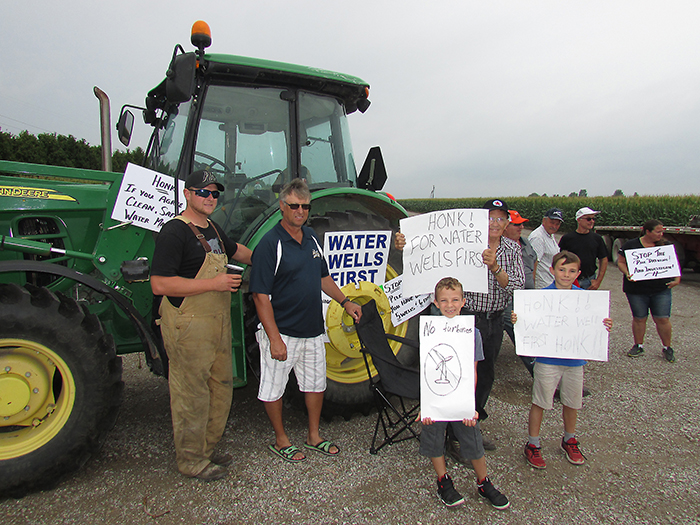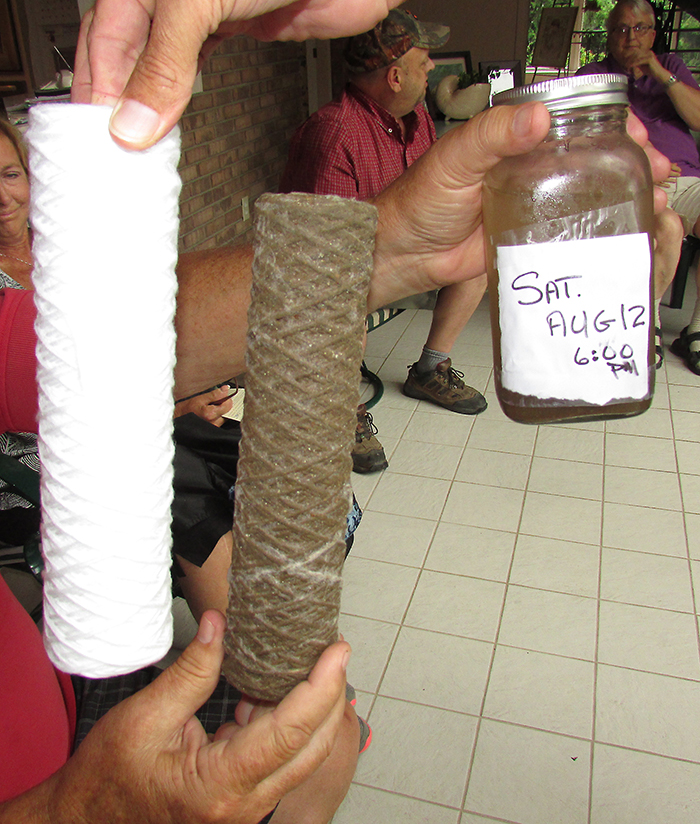
It looks like Chatham-Kent municipal council may finally be prepared to push the Ministry of the Environment regarding the contamination of water wells in the North Kent Wind Farm project area.
Chatham-Kent Coun. Leon Leclair came to a press conference Thursday at the home of Wayne and Valerie Brooksbank on Countryview Line whose well is now clogged with sediment, one of three farms on Countryview that have filed complaints about a well contaminated with sediment.
A pile driver for North Kent Wind Farm was in operation just east of the Brooksbank’s farm until today when a blockade by Water Wells First members stopped construction crews from entering the site.
WWF spokesperson Kevin Jakubec said the group blockaded three of the five turbine construction sites Thursday to try and stop any more wells from being contaminated with sediment, WWF’s main objective.
Leclair said there is support around council, “more now today than yesterday,” for the North Kent residents and he wants to “move forward” and is “frustrated” with the issue of wells going bad for his neighbours, but would not commit to asking the company to halt construction.
“Other councillors support you. We’re not in the press. What we’re doing is behind closed doors. I have been in discussion with other councillors and I’m here to say we’re here to push for resolve in the water wells issue caused by windmill construction and the operation going forward,” Leclair said at the press conference.
He said at the upcoming Aug. 21 council meeting, Coun. Jeff Wesley was to put forward a notice of motion to ask council to contact the Ministry of Environment and Climate Change (MOECC), but would not say what the content of the communication to the MOECC would be.
“I supported the project, but it’s not my project,” Leclair said. “I was under the premise if there was ever an issue, somebody was going to be here to deal with it pronto and not have all kinds of excuses. Going forward, whatever I can do to put the feet to the fire of the MOE, I will.”
Leclair added the municipality was part owner of the project and Jakubec responded, saying, “Then you’re part liable for the problem.”
Jakubec added that WWF expressed concerns over well water safety a year ago, and for council to finally realize that WWF was right, action by council now was “a day late and a dollar short.”
Jakubec challenged Leclair to put forward a motion to halt construction on behalf of his constituents who were out on blockade lines “doing his job.”
At the press conference were the people whose wells have been affected in the North Kent Wind 1 project area – Theresa Pumphrey, Paul and Jessica Brooks, Valerie and Wayne Brooksbank, and a representative for Mark Moir (Countryview Line).
Visibly upset, the property owners talked about the impact on their families’ health and fear about the black shale that is visible in the water that is known to carry arsenic, mercury and other harmful chemicals in it.
Jakubec said MOECC senior hydrogeologist Bruce Harman, who took samples at the Brooksbank well, was at loss to explain how the visible turbidity of the water samples taken was in contradiction to the AECOM report that indicated samples were “visibly clear.”
In water samples taken by Bill Clarke, a licensed expert, of the Brooks well water, the results showed the turbidity (cloudiness) of their water averaged 2.7 NTU (Nephelometric Turbidity Units). The AECOM tests done in February of this year, showed the turbidity at 6.2 NTU. After pile driving began and the Brooks complained, AECOM took another sample of water the tester said was “visibly clear” in a report to Pattern Energy, but the turbidity level they reported was 57.3 NTU. Tests on the same well by the MOECC after pile driving showed the turbidity at 86.8 NTU, which Jakubec said was roughly 30 times the Canadian Drinking Water Standards of 5.0 NTU.
Also, the AECOM lab report dated Aug. 9 had colour as one of the parameters of measure of the water sample. The Canadian Drinking Water Standard guideline for colour is no more than 5 TCU. Before pile driving, AECOM reported the colour at 27 TCU and after pile driving, 281 TCU. According to the standards, “a colour of 15 TCU can be detected in a glass of water by most consumers, and 5 TCU will be apparent in large volumes of water, such as in a bathtub; however few people can detect a colour level of 3 TCU.”
Pumphrey, whose family was one of the first to speak out about her well problem, was upset with Leclair, and said something has to happen now, not later.
“We were one of the first to speak out about this issue early to stop (the well problems) with Brooks, Brooksbanks and Moir from happening. That’s why we spoke up to share our story and council didn’t do anything. You say you’re concerned and we never heard from you,” Pumphrey said. “I reached out to Jeff Wesley when he made his motion at council and I got told I had a beef with municipal council and he wasn’t my representative. I got thrown under the bus when I reached out to him when he’s out in the public saying he’s there to support us.”
Jakubec said the well owners and WWF will not be satisfied with anything less than the halt of construction of the NKW1 project north of Chatham, given all the test results that prove the wells were fine before pile driving began.
“Don’t you dare go back to council with the attitude that there is no proof. The facts are in,” Jakubec said to Leclair.







There is something terribly wrong when your own elected municipal council will not protect their residences from the get go, before the start of construction on something so basic as well water contamination. I hope they are all brought to justice. They need to be held accountable for their decisions beyond the election box. It is all about profits and less about people’s rights for a safe environment.